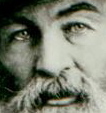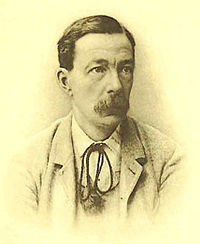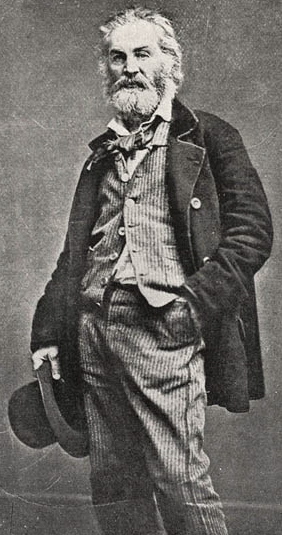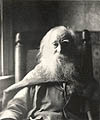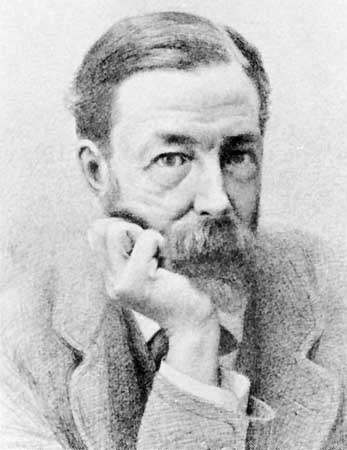Jonathan Ned Katz: "Comrades and Lovers," Act I, Part II
Continued from: Jonathan Ned Katz: "Comrades and Lovers," Act I
- LIGHTS UP ON WHITMAN.
- TITLE: 7 Walt Whitman, "Alone I had thought"
- AS WHITMAN SPEAKS HE IS JOINED, ONE BY ONE, BY A GROUP OF YOUNG MEN. WHITMAN AND THE SPEAKERS ADDRESS EACH OTHER
WHITMAN:
- Alone I had thought --
- yet soon a silent troop gathers around me,
SPEAKER 1:
- Some walk by my side, and some behind,
SPEAKER 2:
- and some embrace my arms or neck,
WHITMAN:
- They, the spirits of friends, dead or alive -- thicker they come, a great crowd, and I in the middle,
SPEAKER 3:
- Collecting, dispensing, singing in spring, there I wander with them,
WHITMAN:
- Plucking something for tokens -- something for these, till I hit upon a name -- tossing toward whoever is near me,
SPEAKER 4:
- Here! lilac, with a branch of pine,
SPEAKER 1:
- Here, out of my pocket, some moss which I pulled off a live-oak in Florida, as it hung trailing down,
SPEAKER 2:
- Here, some pinks and laurel leaves, and a handful of sage,
SPEAKER 3:
- And here what I now draw from the water, wading in the pond-side,
WHITMAN:
- (0 here I last saw him that tenderly loves me -and returns again, never to separate from me, And this, 0 this shall henceforth be the token of comrades -- this calamus-root shall, Interchange it, youths, with each other! Let none render it back!)
- WHITMAN GIVES CALAMUS-ROOT TO SYMONDS, WHO TAKES IT GLADLY, HOLDING IT UP TO AUDIENCE
- SCENE TITLE: 8 John Addington Symonds: "I am taking with me to London"
- SYMONDS ADDRESSES AUDIENCE, HIS CONFIDANT, WITH URGENCY, ON THE TRAIL OF CALAMUS
SYMONDS:
- I am taking with me to London
- an introduction
- to the American Unitarian clergyman, Moncure Conway,
- whose biography of Whitman appeared in the Fortnightly.
- From Conway I hope to learn
- something more
- about the innovator.
- I shall not omit
- to ask Conway questions
- about the substance
- of Whitman's Calamus poems
- with a view to hearing
- what a nest for it
- there is in America.
- TIME PASSES, HE REFOCUSES; MOOD/LIGHTING CHANGE
- I saw Conway.
- I could not get him
- to say anything explicit about Calamus.
- This means that Calamus
- is really very important
- and Conway refuses
- to talk it over with a stranger.
- He cannot be oblivious
- of its plainer meanings.
- If I see Conway again
- I shall consult him further
- about certain Whitman poems.
- FRED VAUGHAN STEPS FORWARD, HIS WORKING CLASS DEMEANOR AND SPEECH CONTRAST WITH SYMONDS' ARISTOCRATIC ENGLISH
- SCENE TITLE: 9 Fred Vaughan, "To form the acquaintance"
VAUGHAN:
- TO WHITMAN
- To form the acquaintance
- of any Boston stage man,
- get on one of those stages
- running to Charleston Bridge, or Chelsea Ferry.
- Introduce yourself as my friend.
- By the way, Walt,
- what do you think of the Common?
- You tell me Mr. Emerson came to see you.
- I heard him lecture on Friday last.
- Though much pleased with the subject,
- I did not at all like his strained delivery.
- But Walt,
- when I thought
- how a few days before
- he had been so attentive to you,
- my heart warmed toward him very much.
- I think he has that in him
- which makes men
- capable of strong friendships.
- This theme he touched on,
- and said that
- a man whose heart was filled with Friendship,
- warm, ever-enduring,
- not-to-be-shaken-by-anything,
- was one to be set on one side
- apart from other men.
- VAUGHAN AND WHITMAN FORM A TABLEAU REPRESENTING SINCERE FRIENDS
- There, Walt,
- what do you think of them
- setting up you and myself
- and one or two others that we know
- in some public place,
- HE LOOKS AROUND THE STAGE AREA
- with a large placard on our breasts:
- VAUGHAN HOLDS UP A PLACARD WITH AN ORNATE SIGN: "SINCERE FRIENDS"
- Good doctrine that.
- WHITMAN MOVES AWAY FROM VAUGHAN TO INSPECT HIS PROOF SHEETS, AND TO DISTANCE HIMSELF FROM VAUGHAN'S INTENSE NEED
- I am glad, Walt,
- you are succeeding so well with your book.
- Send me some of the first proof sheets.
- WHITMAN RESPONDS NEGATIVELY TO VAUGHAN'S DEMAND
WHITMAN:
- TO VAUGHAN
- Are you the new person drawn toward me?
- To begin with, take warning, I am surely far different from what you suppose.
VAUGHAN:
- How is this, Walt?
- I have written to you twice since I heard from you.
WHITMAN:
- Do you suppose you will find in me your ideal?
- Do you think it is so easy to have me become your lover?
VAUGHAN:
- What the devil is the matter?
- Nothing serious I hope.
WHITMAN:
- Do you think the friendship of me would be unalloyed satisfaction?
VAUGHAN:
- I cannot succeed
- in hearing one word from you.
WHITMAN:
- Do you think I am trusty and faithful?
VAUGHAN:
- I swear
- I would have thought
- you to be the last man in the world to neglect me.
WHITMAN:
- Do you see no further than this facade, this smooth and tolerant manner of me?
VAUGHAN:
- I was very much pleased to hear from you.
WHITMAN:
- Do you suppose yourself advancing on real ground toward a real heroic man?
VAUGHAN:
- I want to see you, Walt,
- very much indeed.
WHITMAN:
- Have you no thought 0 dreamer that it may be all maya, illusion?
VAUGHAN:
- I have never thought
- more frequently about you.
WHITMAN:
- o the next step may precipitate you!
VAUGHAN:
- Call and see me
- as soon as you arrive in New York,
- I have much,
- very much
- to talk to you about.
WHITMAN:
- o let some past deceived one hiss in your ears, how many have prest on the same as you are pressing now,
- How many have fondly supposed what you are supposing now only to be disappointed.
VAUGHAN:
- TIME PASSES, HE REFOCUSES; LIGHTING/MOOD CHANGE
- Walt,
- I am to be married tomorrow,
- at 213 West 43rd street.
- I have invited no company.
- I want you to be there.
- Do not fail, please,
- I am very anxious you should come.
- FOUR YEARS PASS, HE REFOCUSES; LIGHTING/MOOD CHANGE
- Walt,
- my life has turned out
- a poor miserable failure.
- I have not been honest to myself,
- my family,
- nor my friends.
- I have written to you, Walt,
- at least once a week
- for the last four years.
- Sometimes I write long letters,
- sometimes short ones.
- I often keep them months
- before I destroy them.
- There is never a day passes
- but what I think of you.
- My love my Walt
- is with you always.
- WHITMAN TURNS FROM VAUGHAN TO A PASSING STRANGER. SCENE TITLE: 10 Walt Whitman, "Passing Stranger!"
WHITMAN:
- Passing stranger! You do not know how longingly I look upon you,
- You give me the pleasure of your eyes, face, flesh, as we pass -- you take of my beard, breast, hands, in return;
- I am to think of you when I sit alone or wake at night alone,
- I am to wait -- I do not doubt I am to meet you again,
- I am to see to it that I do not lose you.
- LIGHT ON EACH MAN AS HE INTRODUCES HIMSELF TO WHITMAN
SPENCER:
- Daniel Spencer
WHITMAN:
- told me
- he had never been in a fight --
SPENCER:
- do not drink at all --
- gone in Second New York Light Artillery,
- deserted, returned to it.
WHITMAN:
- Slept with me.
WILSON:
- David Wilson, about 19.
WHITMAN:
- walking up from Middaugh Street --
WILSON:
- work in blacksmith shop in Navy Yard --
- live in Hampden Street
WHITMAN:
- walks together
- Sunday afternoon
- and night.
- Slept with me.
OSTRANDER:
- Horace Ostrander from Otsego County
- 60 miles west of Albany,
- twenty-eight years of age.
- About 1855
- went on voyage to Liverpool--
- my experiences as a green hand.
WHITMAN:
- Slept with him.
TAYLOR:
- Jerry Taylor, from New Jersey, Second Regiment.
WHITMAN:
- Slept with me last night.
- Weather soft,
- cool enough,
- warm enough,
- heavenly.
- BLACKOUT. SOUND OF DRUMS, BUGLES, MARTIAL MUSIC; PERHAPS A FEW SHOTS IN DISTANCE
- TITLE: 11 Walt Whitman, Thomas Sawyer, Lewis K. Brown, Douglass Fox, "Began my visits"
- LIGHTS UP ON WHITMAN. IN BACKGROUND, PERHAPS PROJECTIONS OF CIVIL WAR PHOTOS
WHITMAN:
- Began my visits
- among the Army hospitals.
- On the banks of the Potomac,
- a large brick mansion,
- the Lacy House,
- used as a hospital,
- only the worst cases.
- A man with his mouth blown out.
- Outdoors,
- in front,
- several dead bodies
- each covered with a brown woolen blanket,
- this war's regulation shroud.
- Nearby,
- at the foot of a tree,
- a heap
- of amputated feet,
- legs,
- arms,
- pieces of men,
- cut,
- bloody,
- black and blue,
- swelled and stinking,
- a load for a one-horse cart.
- In the garden, rear,
- a row of graves,
- a very long row of graves.
- LIGHTING/MOOD CHANGE; WHITMAN, BANTERINGLY, TO AUDIENCE AS HIS SOPHISTICATED, NEW YORK LITERARY MEN-FRIENDS
- Have been on the battle-field among the wounded --
- GOES TO MISSISSIPPI CAPTAIN
- struck up a tremendous friends
- with a young Mississippi captain (about 19)
- that we took prisoner
- badly wounded
- at Fredericksburgh.
- He is in the hospital here,
- met him first in the Lacy House,
- his leg just cut off.
- Poor boy,
- he has suffered a great deal
- has eyes bright as a hawk,
- face pale --
- our affection is quite an affair,
- quite romantic
- TO YOUTH, WHO PUTS HIS ARM AROUND WHITMAN'S NECK, DRAWS HIS FACE DOWN TO KISS HIM
- sometimes
- when I lean over to say I am going,
- he puts his arm round my neck,
- draws my face down,
- WHITMAN LOOKS UP; TO NEW YORK FRIENDS
- quite a scene
- for the New Bowery Theater.
- SERIOUSLY; LIGHTING/MOOD CHANGE
- I find the sick and dying soldiers cling to me --
- These thousands
- of badly wounded young men,
- pallid with diarrhea,
- dying with pneumonia,
- open deeper mines in me than any yet.
- I sometimes fancy myself with typhoid,
- or under the knife,
- tried by terrible tests,
- the living soul's,
- the body's tragedies,
- bursting the petty bonds of art.
- Compared to such scenes
- what are your dramas
- and poems,
- even the tearfulest?
- WHITMAN, SAWYER, AND BROWN MOVE TO AND AWAY FROM EACH OTHER IN A TRIANGULAR DANCE OF ATTRACTION AND RETREAT. LIGHTS UP ON SAWYER, WHO INTRODUCE.S HIMSELF TO WHITMAN
SAWYER:
- Thomas Sawyer.
- LIGHTS UP ON BROWN, WHO INTRODUCES HIMSELF TO WHITMAN
BROWN:
- Lewis K. Brown.
SAWYER:
- TO BROWN
- Give Walter Whitman my love and best wishes for ever;
- tell him I have got
- that little Book witch he gave me,
- and I shall always keep it
- for old acquaintance sake.
WHITMAN:
- TO SAWYER
- Tom,
- I was at Armory Hospital last evening,
- saw Lewy Brown,
- WHITMAN SMILES AT BROWN; GOES TO HIM
- sat with him a good while.
- Lew is so good,
- so affectionate --
- when I came away,
- he reached up his face,
- I put my arm around him,
- and we gave each other a long kiss,
- half a minute long.
- BROWN REACHES UP HIS FACE TO WHITMAN WHO PUTS HIS ARMS AROUND THE SOLDIER; THEN WHITMAN TURNS AWAY FROM BROWN, FOCUSES ON SAWYER
- We talked about you, Tom.
- I wish you was here.
- WHITMAN GLANCES AT BROWN; ADDRESSES SAWYER
- Somehow I don't find the comrade that suits me to a dot --
- and I won't have any other,
- not for good.
- I don't know how you feel about it,
- but it is the wish of my heart
- that if you should come safe
- out of this war,
- we should come together again,
- where we could make a living,
- and be true comrades
- and never be separated--
- and take Lew Brown too.
- BROWN JOINS WHITMAN AND SAWYER. WHITMAN ADDRESSES SAWYER
- If it is destined
- that we shall not meet again,
- you have my love
- whatever should keep you from me,
- no matter how many years.
BROWN:
- TO WHITMAN
- I received a letter to day from Thomas Sawyer.
- He did not mention your letter.
- WHITMAN TURNS TO SAWYER, ADDRESSES HIM
WHITMAN:
- Tom,
- I have not heard from you for some time.
- Lewy Brown has received two letters.
- Walter in Ward E has received one.
- MOVES TO SAWYER
- I was sorry you did not come up to my room
- and get the things
- you promised to accept from me;
- WHITMAN SURVEYS SAWYER'S BODY
SAWYER:
- a good strong blue shirt,
- a pair of drawers.
WHITMAN:
- I should have often thought:
- "Now Tom may be wearing around his body
- something from me."
- Not a day passes, nor a night,
- but I think of you.
- I hope God
- will put it in your heart
- to bear toward me
- a little of the feeling
- I have for you.
- SAWYER TURNS AWAY FROM WHITMAN TO BROWN
- I suppose my letters sound strange to you,
- but I am only expressing
- the feelings of my heart.
- WHITMAN TURNS TO BROWN, WHO ADDRESSES HIM
BROWN:
- I am sorry to hear you wer sick, Walt.
- It would be better for your health
- if you would give yourself that furlou
- but the boys about the Hospital
- could ill spare you,
- if you are as good to them
- as you wer to me.
- My leg continues to mend verry slow.
WHITMAN:
- TO BROWN
- Lewy,
- dear son and comrade,
- your photograph has been received,
- and the good sight of your face welcomer than all,
- my darling.
- o Lewy,
- how glad I should be to have you with me.
- WHITMAN ADDRESSES SAWYER, TURNS BACK ON BROWN
- Tom,
- you did not answer
- my last two letters,
- still I will write again.
- I see Lewy Brown always.
- Lewy's leg has not healed.
- Tom,
- I should like to know how things have gone for three months past.
- I can't understand
- why you have ceased to correspond.
- Do you want to shake me off?
- LIGHTING/MOOD CHANGE; END OF SAWYER-BROWN-WHITMAN TRIANGLE. WHITMAN TURNS TO A NEW FRIEND, DOUGLASS FOX, WHO APPEARS IN LIGHT. WHITMAN SPEAKS TOBROWN
- Lew,
- I wish you to go in Ward G
- and find a very dear friend of mine in bed 11
- FOX INTRODUCES HIMSELF TO AUDIENCE
FOX:
- Douglass Fox.
WHITMAN:
- TO BROWN, INDICATING FOX
- Tell him I sent him my best love,
- and that he must not forget me,
- though I know he never will.
FOX:
- TO WHITMAN
- You will allow me to call you Father, won't you?
- Both my parents are dead
- and now, Walt,
- you will be a second father to me.
- I have never before
- met with a man that I could love as I do you.
- Still there is nothing strange about it.
WHITMAN:
- Dear son,
- I cannot bear the thought
- of being separated from you--
- I know I am a great fool about such things,
- but I tell you the truth.
- I do not think one night has passed
- when I have been at the theatre
- but what amid the play
- I would see your face before me,
- and I would realize
- how happy it would be
- if I could leave all the fun and noise
- and be with you.
- I hope you are quite well
- and with your dear wife,
- for I know you have long wished
- to be with her.
FOX:
- I have often thought of what you told me
- when I said
- I am certain I will come back to Washington.
WHITMAN:
- A great many of the boys have said the same
- but none has returned.
FOX:
- I am sorry it is so
- but after I had thought it over
- I concluded it would be better for me
- to go into some business here.
- LIGHTING, MOOD CHANGE
BUSH:
- INTRODUCING HIMSELF TO AUDIENCE
- Alonzo S. Bush
- TO WHITMAN
- I am glad to know, Walt,
- that you are once more
- in the Noted City of Washington
- So that you can go often
- and see that Friend of ours
- at Armory Square Hospital
- Lewy K. Brown
- BROWN JOINS BUSH IN LIGHT
- that fellow
- that went down on your BK,
- both so often with me.
- I wish that I could see him this evening
- and go in the Ward Master's Room
- and have some fun
- for he is a gay boy.
- LIGHTING/MOOD CHANGE; BUSH REFOCUSES
- I am very Sorry indeed
- to hear that after laying so long
- he is about to loose his leg.
- THROUGHOUT WHITMAN'S NEXT SPEECH WE MAY OCCASIONALLY HEAR BROWN'S GROANS AND HALF-COHERENT TALK ABOUT WHITMAN
WHITMAN:
- Today,
- after dinner,
- Lewy Brown had his left leg amputated
- five inches below the knee.
- I was present at the operation,
- most of the time at the door.
- Lewy came out of the ether.
- Then it bled.
- They thought
- an artery had opened.
- They began to cut the stitches and make a search
- but after some time concluded
- it was only surface bleeding.
- They then stitched it up again
- and Lew felt every one of these stitches.
- They did not think it safe
- to give him more ether.
- BROWN CRIES OUT
- I caught glimpses of him
- through the open door.
- At length they finished,
- and brought the boy in on his cot.
- The ether and exhaustion
- had their effect for some time.
- His face was very pale, his eyes dull.
- BROWN ASKS FOR "WALT"
- He remained very sick,
- opprest for breath,
- with deathly feeling,
- in the stomach,
- head,
- and great pain in the leg.
- As usual in such cases
- he could feel
- the lost foot and leg very plainly.
- The toes would get twisted,
- and not possible to disentangle.
- BROWN AGAIN ASKS FOR "WALT"
- About 7 o'clock in the evening
- he dozed into a sleep
- for a couple of hours.
- The rest of the night
- was very bad.
- I remained all night,
- slept on the adjoining cot.
- The same next night.
- LIGHTING/MOOD CHANGE; WHITMAN REFOCUSES ON DOUGLASS FOX AND ADDRESSES HIM
- Douglass,
- I have thought of you many times
- since the days there in the hospital
- during the war.
- Lewis Brown is well.
- I see him often.
- Tom Sawyer,
- (Lewy Brown's friend)
- passed safe through the war --
- but we have not heard from him now for two years.
- All the big hospitals are long broken up.
- I send you my love,
- dear friend and soldier.
- LIGHTING/MOOD CHANGE; WHITMAN REFOCUSES ON THE AUDIENCE AS CONFIDANT
- WHITMAN IS AN OLD, ILL MAN HERE, BUT STILL FULL OF INNER FIRE
- My letters,
- sent to the boys
- in the days of the War,
- stir up memories
- joyful, painful.
- There is nothing beyond the comrade --
- the man,
- the woman:
- nothing beyond:
- even our lovers
- must be comrades:
- even our wives, husbands, mothers, fathers:
- we can't stay together, feel satisfied,
- grow bigger,
- on any other basis.
- You look on me now with the ravages
- of that war experience
- finally reducing me to powder.
- I had to give up health for it,
- but I am satisfied
- with what I got.
- I got the boys:
- the boys:
- thousands of them:
- they were,
- they are,
- they will be mine.
- I gave myself for them:
- myself:
- I got the boys:
- but for this
- I would never have had Leaves of Grass,
- the consummated book.
- I got that:
- the Leaves,
- the boys.
- ONE OF WHITMAN'S BOYS, JOHN ADDINGTON SYMONDS, NOW 30-YEARS OLD, FOR THE FIRST TIME REACHES OUT TO HIM. SYMONDS DIRECTLY ADDRESSES WHITMAN, WHO IS SEATED WITH HORACE TRAUBEL
- SCENE TITLE: 12 John Addington Symonds, "When a man"
SYMONDS:
- When a man
- has dedicated a poem to another man
- I think he is bound
- to confess the liberty.
- This is my excuse
- for sending you
- the crude work
- in which you may detectsome echo
- of your Calamus theme.
- Since I first took up Leaves of Grass
- in a friend's rooms
- at Trinity College
- six years ago,
- your poems
- have been my constant companions.
- I have found in them
- pure air and health --
- the free breath of the world
- when often cramped by illness.
- What one man can do
- by communicating to those he loves
- the treasures he has found
- I have done among my friends.
- I say this to tell you,
- as simply as I can,
- how much lowe you.
- I am an Englishman,
- a historian and critic of art and literature,
- aged thirty,
- married,
- with three daughters.
- SYMONDS AND WHITMAN IN MOTIONLESS TABLEAU WHILE TRAUBEL INTRODUCES HIMSELF TO AUDIENCE
TRAUBEL:
- Horace Traubel.
- In the last four years of Whitman's life
- I recorded his words faithfully
- after daily visits.
- He knew I would write of him someday.
- WHITMAN, RESPONDING TO SYMONDS, SPEAKS TO TRAUBEL
WHITMAN:
- That was the first of Symonds' letters.
- ADDRESSING SYMONDS ALONG WITH TRAUBEL
- Symonds has always seemed to me
- a forthright man,
- unhesitating,
- without cant:
- not slushing over,
- not freezing up.
- He is warm
- (not too warm),
- a bit inquisitive,
- ingratiating.
- A Symonds letter
- is a red day for my calendar.
- I am always strangely moved by a letter from Symonds:
- it makes the day,
- it makes many days,
- sacred.
SYMONDS:
- TO WHITMAN
- Your words
- give me the keenest pleasure.
- I had not exactly expected to hear from you.
- I was beginning to dread
- that the poem I sent
- confounded your own pure feeling
- with the baser metal
- of my own nature.
- You have reassured me.
- For many years
- I have been attempting
- to explain in verse
- some of the forms
- of what you call "adhesiveness."
- I have traced passionate friendship
- through Greece,
- Rome,
- the medieval
- and the modern world.
- While engaged in this work
- I first read Leaves of Grass.
- Especially did I then learn that
- the Comradeship,
- which I conceived
- as on a par
- with the sexual feeling
- was real--
- not a delusion of distorted passions,
- not a dream of the past --
- but a vital bond
- of man to man.
- Yet even then
- how hard I found it --
- brought up in English feudalism,
- educated at an aristocratic school
- and over-refined university
- to be a simple human being.
- How you helped me!
- I have pored for continuous hours
- over the pages of Calamus
- (as I used to poor over Plato),
- longing to hear you speak,
- burning for a revelation
- of your developed meaning,
- panting to ask --
- is this what you would indicate?
- Most of all
- did I desire
- to hear from your own lips
- some story of athletic friendship
- from which to learn the truth.
- Yet I dared not address you.
- Shall I ever be permitted to question you?
WHITMAN:
- TO TRAUBEL
- Well, what do you think of that?
- Do you think that could be answered?
- You know I hate to be catechized.
- Symonds is right,
- no doubt,
- to ask the questions:
- I am just as much right
- if I do not answer them.
- TO SYMONDS
- I often say to myself about Calamus
- perhaps it means more or less
- than what I thought myself.
- means different:
- perhaps I don't know
- what it all means
- perhaps never did know.
- TO TRAUBEL
- My first instinct
- about all that Symonds writes
- is violently reactionary
- TO SYMONDS
- is strong and brutal for no, no, no.
- Then the thought intervenes
- that I maybe do not know all my own meanings.
- Sometime or other
- I will respond to Symonds
- definitely about Calamus.
- TO TRAUBEL
- You will be writing about Calamus some day
- and what I say
- may help to clear your ideas.
- WHITMAN ENDS EMPHATICALLY, EVEN DESPERATELY -- HE KNOWS HIS SEXUAL MAN-LOVE CALAMUS POEMS MAY WELL COMPROMISE HIS FUTURE REPUTATION AS REPRESENTATIVE AMERICAN MAN AND POET
- Calamus needs clear ideas:
- it may be easily,
- innocently
- distorted.
